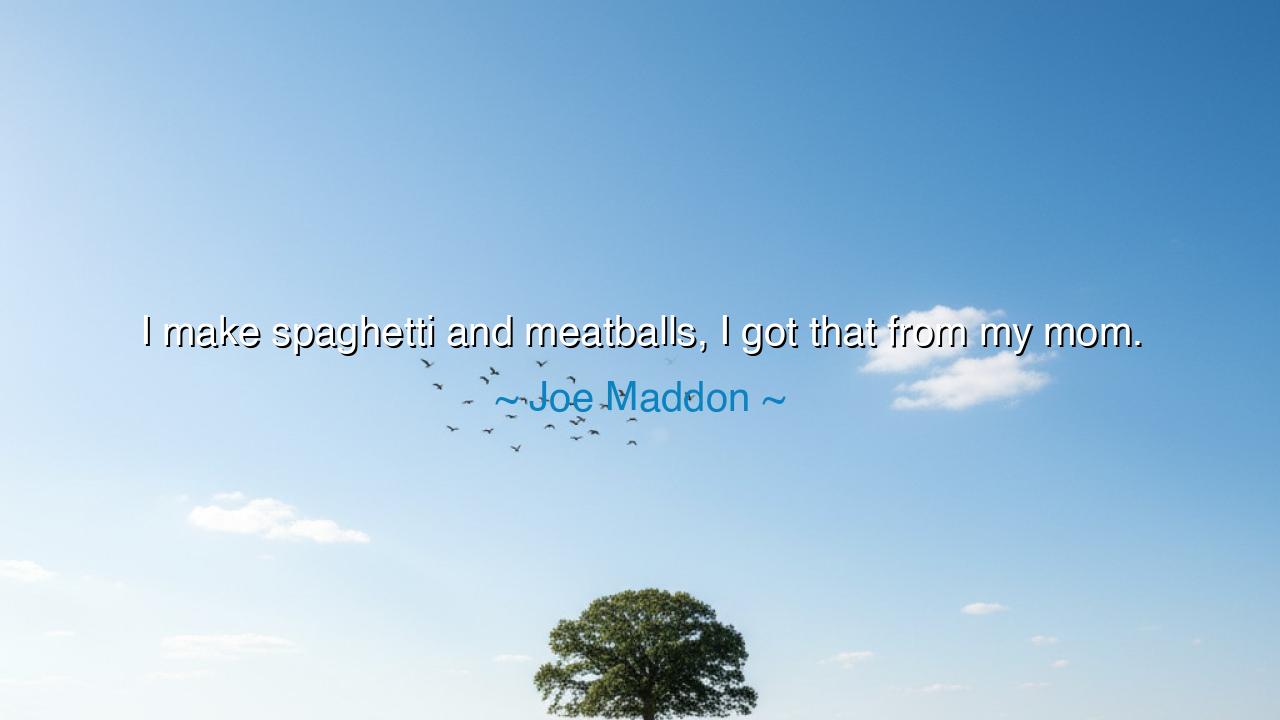
I make spaghetti and meatballs, I got that from my mom.






In the humble yet profound words of Joe Maddon, baseball manager and thinker of life’s deeper game, we hear a truth older than any sport, older than fame or success: “I make spaghetti and meatballs, I got that from my mom.” On the surface, these words seem simple — a man speaking fondly of his mother and the meal she taught him to prepare. Yet beneath them lies a timeless current of meaning: the inheritance of love, culture, and wisdom passed quietly from one generation to the next. For in every act of care — even in the making of a meal — there is a story, a lineage, and a sacred connection between past and present.
The origin of this quote lies in Maddon’s reflections on his Italian-American upbringing, in a home where the kitchen was the heart of the household. His mother’s cooking, steeped in tradition, was more than nourishment; it was an expression of love and identity. When he says, “I got that from my mom,” he is not merely speaking of a recipe — he is acknowledging the transmission of values: patience, generosity, and the joy of giving. For in learning to make spaghetti and meatballs, he learned also to serve others, to care through action, and to remember that greatness is built not on what one takes, but on what one gives.
The ancients knew well that such domestic acts carried divine significance. In ancient Greece, the hearth was sacred to Hestia, goddess of home and flame, for it was there that families found unity and meaning. To tend the fire and prepare food was to keep the world in balance. So too in Maddon’s words do we hear this same reverence: the recognition that greatness begins not in grand arenas, but in simple places — at the table, in the home, under the quiet guidance of those who love us. A mother’s lesson, carried forward by her child, becomes a living thread in the tapestry of humanity.
There is, too, in Maddon’s memory, a subtle heroism. For in a world obsessed with speed, fame, and spectacle, he pauses to honor simplicity — a plate of spaghetti, a mother’s hand, a familiar aroma filling the kitchen. It is a reminder that heritage lives in the ordinary, and that in preserving these ordinary moments, we guard against forgetting who we are. Just as warriors of old honored their ancestors through song or ritual, so too does the modern man honor his through the small, sacred repetitions of life: a meal, a story, a family gathering.
Consider the story of Marcus Aurelius, the philosopher-emperor. In his Meditations, he often wrote of the virtues he learned from those around him — from his father, simplicity; from his teacher, humility; and from his mother, piety and compassion. He understood, as Maddon does, that our truest inheritance is not gold or power, but character. When Joe Maddon makes spaghetti and meatballs, he is, in his own way, performing a meditation — remembering where he came from, and expressing gratitude through the act of creation.
Yet there is also wisdom here for the modern soul: that memory and tradition are acts of resistance against a world that forgets too quickly. Every time we cook what our parents once cooked, or repeat their gestures of kindness, we preserve something sacred from being lost. The mother who taught her child to cook did not merely pass down flavors; she passed down continuity, belonging, and the knowledge that love, once given, does not die — it becomes part of the hands and hearts that carry it forward.
The lesson, then, is simple but eternal: honor where you come from. In every humble act — whether in food, craft, or conversation — recognize the voices that shaped you. Do not believe that greatness lies only in new things; sometimes it lies in the things that endure. Revisit the traditions that ground you. Cook the old recipes. Speak the old stories. Share them with those who come after you, as your parents shared them with you. For it is through such small inheritances that the spirit of a people survives.
So let us remember, as Joe Maddon reminds us, that even a dish of spaghetti and meatballs can carry the wisdom of generations. It is not only food, but memory. It is not only tradition, but gratitude. When we honor those who came before us — when we pause to say, “I got that from my mom” — we become part of something enduring and eternal: the human story of love passed hand to hand, from heart to heart, across the ages.






AAdministratorAdministrator
Welcome, honored guests. Please leave a comment, we will respond soon